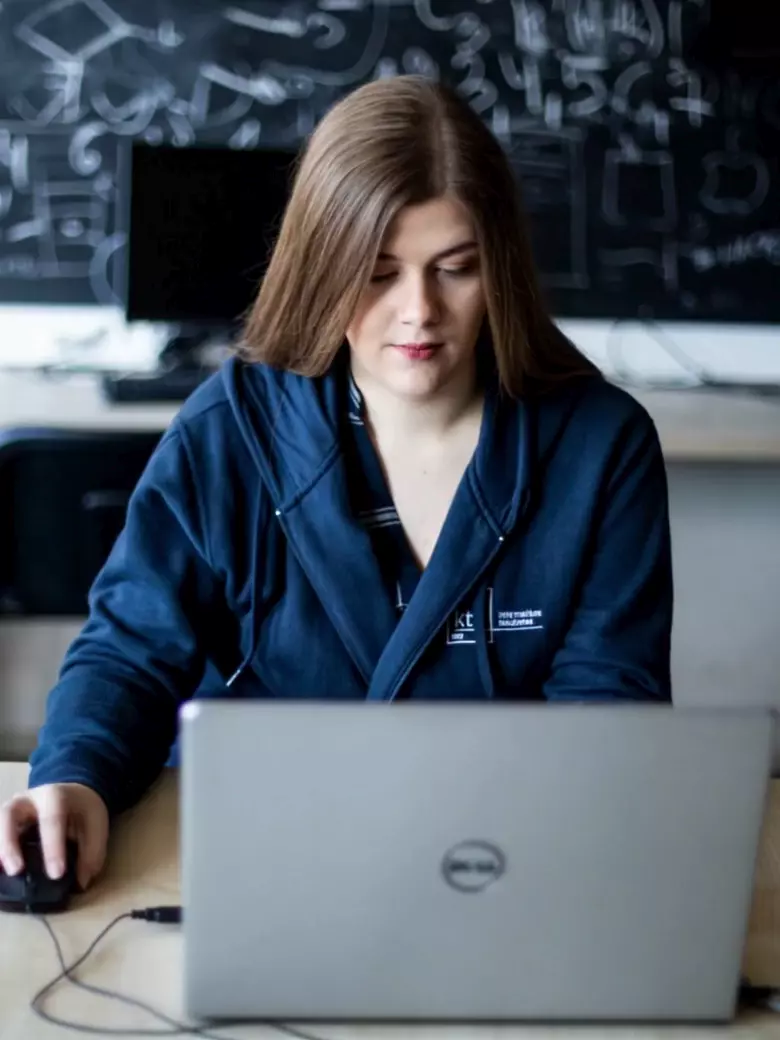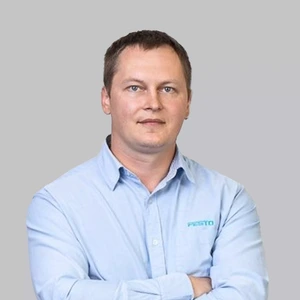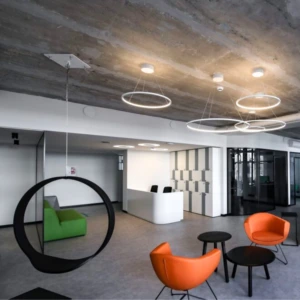The programme is only conducted in Lithuanian language. Entry requirements for this particular programme can be found in the programme description provided in Lithuanian language.
in Lithuanian
Create the smartest solutions
The challenge of the future is to manage the information technology around us and ensure its security and reliability. By studying Informatics Engineering, you’ll learn how to design, develop and deploy software and hardware, solve organisations’ technology challenges and manage intelligent systems’ environments. Informatics engineers become professionals who not only master new technologies, but also create solutions that we can only imagine.

Based on project-based and problem-based learning, students work in teams to solve real-world challenges and develop the smart systems and innovative devices of the future. During their studies they work with cutting-edge IT technologies.

You will work with the latest software packages and will have access to a continuously updated hardware base. Also, you will have access to the state-of-the-art laboratories and equipment of the KTU Santaka Valley.

You will be involved in a product development project where you will work in teams in collaboration with KTU researchers and social partners. Together you will solve current problems and find solutions that will allow you to improve teamwork and project management skills, deepen professional knowledge and broaden career opportunities.

The field of informatics engineering is extremely broad, so at the end of your second year, you can choose between two specialisations or create your tailor-made combination of study modules.
Choose your career path in the development and maintenance of secure information technology solutions. This programme will provide you with in-depth knowledge of computer science methods, engineering principles, and the practical application of technology in the design, implementation, and support of computer systems and networks. You will explore topics such as cloud computing and virtualisation, the Internet of Things, cybersecurity, specialised computing device programming, and robotics.
In your career, you will be able to analyse business needs and recommend IT solutions based on functionality, performance, reliability, safety, and cybersecurity requirements.
Here are some of the careers you can pursue after your studies:
Responsible for the design, maintenance and improvement of various IT systems. Analyses data, develops software, administers networks and ensures cybersecurity.
Designs and maintains IT systems, analyses security events, responds to incidents, identifies threats, conducts security audits, searches for vulnerabilities in systems, and provides recommendations.
Designs smart devices, develops device software and integrates them into the web. Responsible for developing and testing devices, and improving IoT systems.
| Module name | Credits | Method of organisation |
|---|
| Computer Graphics | 6 | On-campus learning |
| Fundamentals of Object-Oriented Programming 1 | 9 | On-campus learning |
| Introduction to Studies of Informatics | 9 | On-campus learning |
| Mathematics 1 | 6 | On-campus learning |
| Module name | Credits | Method of organisation |
|---|
| Fundamentals of Object-Oriented Programming 2 | 6 | On-campus learning |
| Mathematics 2 | 6 | On-campus learning |
| Physics 1 | 6 | On-campus learning |
| The First Principles of Digital Logic | 6 | On-campus learning |
| Media Philosophy | 6 | Blended learning |
| Sustainable Development | 6 | On-campus learning |
| Module name | Credits | Method of organisation |
|---|
| Academic and Technical Communication in English (Level C1) | 6 | On-campus learning |
| Basics of Data Structures | 6 | On-campus learning |
| Computer Architecture | 6 | On-campus learning |
| Discrete Structures | 6 | On-campus learning |
| Theory of Probability and Statistics | 6 | On-campus learning |
| Module name | Credits | Method of organisation |
|---|
| Databases | 6 | On-campus learning |
| Design and Analysis of Computer Algorithms | 6 | On-campus learning |
| Operating Systems | 6 | On-campus learning |
| Software Engineering | 6 | On-campus learning |
| Optional Subjects 2026 IF | 6 |
| Module name | Credits | Method of organisation |
|---|
| Analysis and Design of Computer Systems | 6 | On-campus learning |
| Computer Networks and Internet Technologies | 6 | On-campus learning |
| Computerised Environment and Smart Systems | 6 | On-campus learning |
| Information Technology Security | 6 | On-campus learning |
| Secure System Development Fundamentals | 6 | On-campus learning |
| Digital Signals and Circuits | 6 | On-campus learning |
| On-campus learning |
| Module name | Credits | Method of organisation |
|---|
| Cyber Security | 6 | On-campus learning |
| Product Development Project | 12 | On-campus learning |
| Data Storages | 6 | On-campus learning |
| Security of Electronic Documents and Data | 6 | On-campus learning |
| Fundamentals of Multi-Agent Systems | 6 | On-campus learning |
| Real Time Systems | 6 | On-campus learning |
| On-campus learning |
| Module name | Credits | Method of organisation |
|---|
| Cyber Physical Systems and it Security | 6 | On-campus learning |
| Enterprise Computer Systems Development Platforms | 3 | On-campus learning |
| Optional Subjects 2026 IF | 3 |
| Engineering Economics | 6 | On-campus learning |
| Sustainable Human Development | 6 | On-campus learning |
| System Administration and Technical Support | 6 | On-campus learning |
| System Integration Technologies and Secure Service Development | 6 | On-campus learning |
| Computer Systems Engineering | 6 | On-campus learning |
| Things of Internet and Technologies | 6 | On-campus learning |
| On-campus learning |
| Module name | Credits | Method of organisation |
|---|
| Bachelor’s Degree Final Project | 15 | On-campus learning |
| Professional Internship | 15 | On-campus learning |
The programme is only conducted in Lithuanian language. Entry requirements for this particular programme can be found in the programme description provided in Lithuanian language.
in Lithuanian

The knowledge you gain from studying Software Engineering provides a foundation that can be used in the job market or academia. The university goes beyond technical skills to provide the social competencies needed for the workplace. The experience and knowledge I gained at KTU helped me to find a job and achieve my goals.
I chose this study programme because I was interested in cybersecurity – a topical and relatively new field. The programme itself is interesting because you can learn more about programming, operating systems, information technologies and cyber security. It is this diversity in the whole study process that I enjoyed the most.

KTU stands out for its high-level study programmes in the fields of information technology, cybersecurity and the Internet of Things. Graduates of Informatics Engineering come to companies with a strong theoretical foundation, practical skills, problem-solving abilities and the ability to adapt to innovations. The University’s cooperation with businesses and participation in project activities gives them additional advantages in the job market.
The programme is taught entirely in Lithuanian and all educational components, including exams and assignments, are delivered in this language.
Unlike other study programmes at the Faculty of Informatics, students studying the Informatics Engineering programme learn about computer systems, computerisation of smart objects and environments, and cybersecurity technologies, which are highly sought-after skills in today’s job market.
The key to studying Informatics Engineering is curiosity and a willingness to learn about the development and management of new technologies. A good knowledge of mathematics and a minimum of programming would also help during your studies.

Talk to us, study with us:
K. Donelaičio St. 73, LT-44249 Kaunas
phone +370 679 44 555
email studijos@ktu.lt
Faculty of Informatics
XI Chamber
Studentų St. 50, LT-51368 Kaunas
email if@ktu.lt
 virtual tour
virtual tour